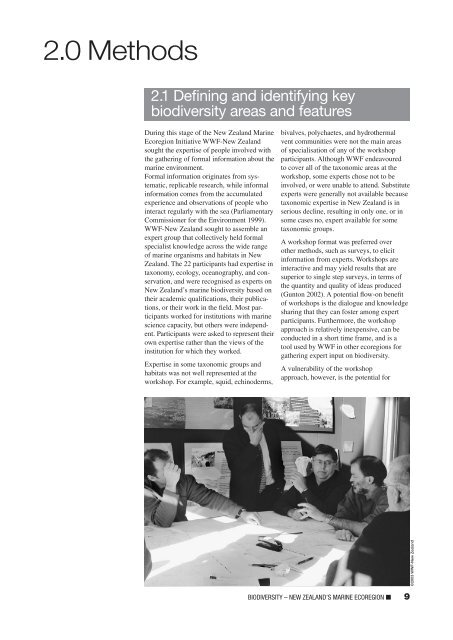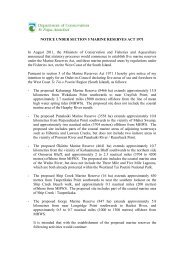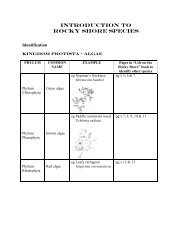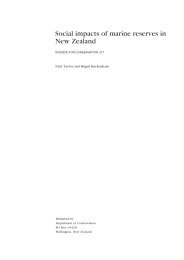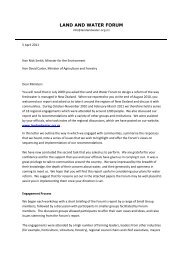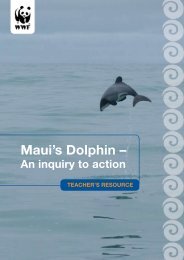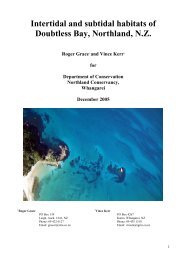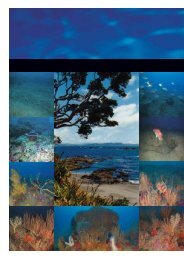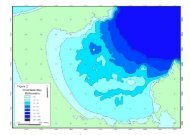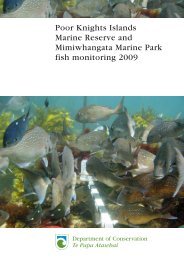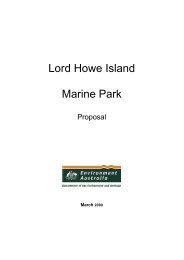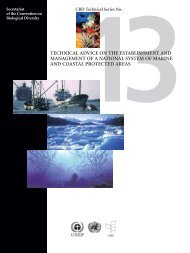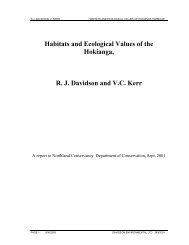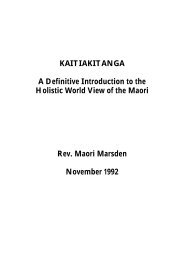WWF Shining a spotlight on the biodiversity of ... - MarineNZ.org.nz
WWF Shining a spotlight on the biodiversity of ... - MarineNZ.org.nz
WWF Shining a spotlight on the biodiversity of ... - MarineNZ.org.nz
You also want an ePaper? Increase the reach of your titles
YUMPU automatically turns print PDFs into web optimized ePapers that Google loves.
2.0 Methods<br />
2.1 Defining and identifying key<br />
<strong>biodiversity</strong> areas and features<br />
During this stage <strong>of</strong> <strong>the</strong> New Zealand Marine<br />
Ecoregi<strong>on</strong> Initiative <str<strong>on</strong>g>WWF</str<strong>on</strong>g>-New Zealand<br />
sought <strong>the</strong> expertise <strong>of</strong> people involved with<br />
<strong>the</strong> ga<strong>the</strong>ring <strong>of</strong> formal informati<strong>on</strong> about <strong>the</strong><br />
marine envir<strong>on</strong>ment.<br />
Formal informati<strong>on</strong> originates from systematic,<br />
replicable research, while informal<br />
informati<strong>on</strong> comes from <strong>the</strong> accumulated<br />
experience and observati<strong>on</strong>s <strong>of</strong> people who<br />
interact regularly with <strong>the</strong> sea (Parliamentary<br />
Commissi<strong>on</strong>er for <strong>the</strong> Envir<strong>on</strong>ment 1999).<br />
<str<strong>on</strong>g>WWF</str<strong>on</strong>g>-New Zealand sought to assemble an<br />
expert group that collectively held formal<br />
specialist knowledge across <strong>the</strong> wide range<br />
<strong>of</strong> marine <strong>org</strong>anisms and habitats in New<br />
Zealand. The 22 participants had expertise in<br />
tax<strong>on</strong>omy, ecology, oceanography, and c<strong>on</strong>servati<strong>on</strong>,<br />
and were recognised as experts <strong>on</strong><br />
New Zealand’s marine <strong>biodiversity</strong> based <strong>on</strong><br />
<strong>the</strong>ir academic qualificati<strong>on</strong>s, <strong>the</strong>ir publicati<strong>on</strong>s,<br />
or <strong>the</strong>ir work in <strong>the</strong> field. Most participants<br />
worked for instituti<strong>on</strong>s with marine<br />
science capacity, but o<strong>the</strong>rs were independent.<br />
Participants were asked to represent <strong>the</strong>ir<br />
own expertise ra<strong>the</strong>r than <strong>the</strong> views <strong>of</strong> <strong>the</strong><br />
instituti<strong>on</strong> for which <strong>the</strong>y worked.<br />
Expertise in some tax<strong>on</strong>omic groups and<br />
habitats was not well represented at <strong>the</strong><br />
workshop. For example, squid, echinoderms,<br />
bivalves, polychaetes, and hydro<strong>the</strong>rmal<br />
vent communities were not <strong>the</strong> main areas<br />
<strong>of</strong> specialisati<strong>on</strong> <strong>of</strong> any <strong>of</strong> <strong>the</strong> workshop<br />
participants. Although <str<strong>on</strong>g>WWF</str<strong>on</strong>g> endeavoured<br />
to cover all <strong>of</strong> <strong>the</strong> tax<strong>on</strong>omic areas at <strong>the</strong><br />
workshop, some experts chose not to be<br />
involved, or were unable to attend. Substitute<br />
experts were generally not available because<br />
tax<strong>on</strong>omic expertise in New Zealand is in<br />
serious decline, resulting in <strong>on</strong>ly <strong>on</strong>e, or in<br />
some cases no, expert available for some<br />
tax<strong>on</strong>omic groups.<br />
A workshop format was preferred over<br />
o<strong>the</strong>r methods, such as surveys, to elicit<br />
informati<strong>on</strong> from experts. Workshops are<br />
interactive and may yield results that are<br />
superior to single step surveys, in terms <strong>of</strong><br />
<strong>the</strong> quantity and quality <strong>of</strong> ideas produced<br />
(Gunt<strong>on</strong> 2002). A potential flow-<strong>on</strong> benefit<br />
<strong>of</strong> workshops is <strong>the</strong> dialogue and knowledge<br />
sharing that <strong>the</strong>y can foster am<strong>on</strong>g expert<br />
participants. Fur<strong>the</strong>rmore, <strong>the</strong> workshop<br />
approach is relatively inexpensive, can be<br />
c<strong>on</strong>ducted in a short time frame, and is a<br />
tool used by <str<strong>on</strong>g>WWF</str<strong>on</strong>g> in o<strong>the</strong>r ecoregi<strong>on</strong>s for<br />
ga<strong>the</strong>ring expert input <strong>on</strong> <strong>biodiversity</strong>.<br />
A vulnerability <strong>of</strong> <strong>the</strong> workshop<br />
approach, however, is <strong>the</strong> potential for<br />
©2003 <str<strong>on</strong>g>WWF</str<strong>on</strong>g>-New Zealand<br />
BIODIVERSITY – NEW ZEALAND’S MARINE ECOREGION ■ 9


